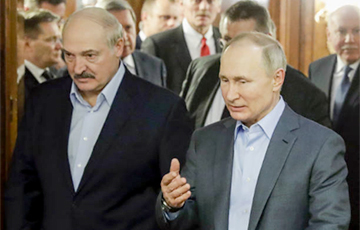Why Lukashenka’s Statement On ‘Putin’s Offer’ Is Likely To Appear A Lie
- 25.02.2020, 15:15
- 1,561

It seems doubtful that the Kremlin is ready to compensate Belarus for the costs of the tax maneuver.
Last Friday, Aliaksandr Lukashenka reported good news: Vladimir Putin phoned him and expressed his willingness to compensate for the $ 300 million export duty revenue that was lost due to the tax maneuver, Solidarity writes.
On the same day, Lukashenka, at a meeting with Ambassador to Russia Uladzimir Siamashka, said he was counting on compensation in the amount of $ 420-430 million.
After that, there was a pause: neither in Minsk nor in Moscow did they inform when the contracts for resuming oil supplies to Belarus could be signed, and on what specific conditions.
Still, the doubts have surfaced that the Russians are actually ready to offer an option that suits the Belarusian side.
And the point is not only that, as it turned out, “each side makes its own calculation”, and the government of the Russian Federation generally voiced a rather ridiculous version of the compromise.
If you trace the history of the negotiations between Minsk and Moscow over the past year and a half, you will see that the Belarusian authorities have repeatedly announced the achievement of victories.
If we only deal with the issue of tax maneuver, then, according to the ambassador of Belarus to Russia, the compensation formula should have been determined by December 15, 2018. Then Uladzimir Siamashka expressed confidence that on February 13, 2019 “there will be a solution to the issues related to the tax maneuver, oil and gas”.
And the Belarusian ambassador announced the most epic forecast two and a half months ago, in early December.
First, Siamashka spoke about resolving the issue of tax maneuver: cost compensation will begin on January 1, 2022, when the unification of tax legislation is completed. As for 2020, the parties will revise the oil pricing formula and “this gives certain guarantees that our refineries should go through the year 2020 painlessly.” In fact, the Belarusian refineries are still, as they say, on a hungry diet.
Secondly, Siamashka’s statement that Minsk and Moscow “in the next two weeks” will resolve the issue of the price of Russian gas did not come true. The price protocol for 2020 was eventually signed only in mid-February.
Thirdly, the statement that the Rosselkhoznadzor would be deprived of the “veto right” for the supply of Belarusian products turned out to be a fake.
“After a rather lengthy discussion, Russian President Vladimir Putin agreed that the prerogative or the right to close, for example, meat processing plants, dairies should belong to the head veterinarian of Belarus: he should sort out what is wrong,” said Siamashka.
It was about the Rosselkhoznadzor, which recently withdrew more than 600 kg of Belarusian milk from the Moscow exhibition “Prodexpo 2020”, which infuriated Lukashenka.
This time, Lukashenka himself publicly spoke about Moscow’s oil concessions (“Putin suggested that they compensate this money to Belarus. He admitted that it was fair”), which, perhaps, really testifies to the parties approaching a compromise.
But the previous statements of the Belarusian authorities seem to warn: one should not be surprised if this time it will be impossible to agree.








